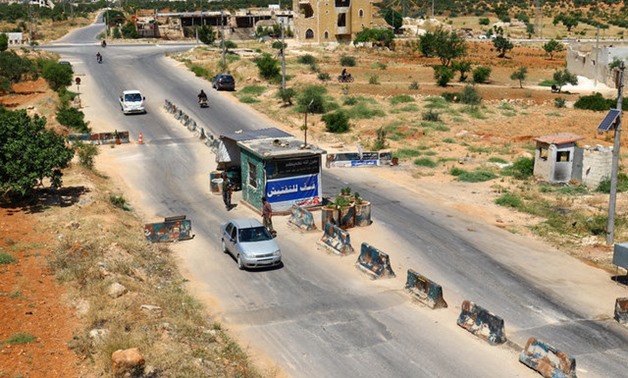
Members from a coalition of rebel groups called "Jaish al Fateh", also known as "Army of Fatah" (Conquest Army), man a checkpoint in Idlib city - Reuters
AMMAN - 20 July 2017: Two major rival Islamist insurgent groups battled for a second successive day in northwestern Syria and began reinforcing themselves elsewhere on Thursday in a possible prelude to wider-scale inter-rebel fighting, rebel sources said.
Infighting has weakened the Syrian opposition since the start of the uprising against President Bashar al-Assad in 2011. Their turf wars have helped Assad and his allies recover significant ground in the north and around the capital Damascus.
Tensions have been building between Idlib province's two biggest insurgent factions mainly over ideological differences between Islamist militant and more nationalist-leaning armed factions. They have also vied for dominance in the only Syrian province that is entirely under rebel control.
Rebel sources said clashes persisted in most of Idlib's major towns after a second day of heavy fighting between Hayat Tahrir al-Sham, a faction led by the formerly al Qaeda-affiliated group earlier known as the Nusra Front, and its Islamist rival Ahrar al-Sham.
Even outside Idlib, Tahrir al-Sham and Ahrar al-Sham - which have thousands of fighters spread across Syria - were reinforcing their positions and putting their forces on heightened alert, according to a rebel source in northern Syria.
Recent clashes on the outskirts of Idlib province towns that the warring factions had promised to local councils would be spared from conflict has raised the risk of fighting spilling into these heavily populated urban areas, rebel sources said.
Tahrir al-Sham on Thursday rejected a mediation initiative by prominent Islamic clerics. It said the only way to end the fighting was to set up a regional local administration for the rebel-held north that would help reconcile factions and deter foreign meddling in the conflict.
Idlib city, the provincial capital where Tahrir and Ahrar have a power-sharing deal, has so far been spared fighting. It has become a refuge for tens of thousands of displaced Syrians during the more than six-year-long civil war.
On Idlib battlefields where fighting began in earnest on Wednesday, Ahrar al-Sham withdrew from the city of Saraqeb in order to spare civilians who had protested against the fighting, but pushed Tahrir al-Sham forces out of nearby smaller towns.
Tahrir al-Sham appeared to have gained the upper hand in some areas of Idlib, ousting Ahrar al-Sham from a string of villages along the border with Turkey, rebel officials said.
Ahrar al-Sham pulled out of Harem and Salqeen towns without a fight but gave up the bigger towns of Sarmada and Dana only after fierce battles, an Ahrar rebel source said.
CONTESTED BORDER ZONE
Tahrir al-Sham was sending reinforcements to the Bab al-Hawa border crossing with Turkey that is controlled by Ahrar al-Sham and represents a major commercial and civilian gateway into rebel-held Idlib. Taxes imposed on goods passing through Bab al-Hawa also provide a lucrative source of revenue for Ahrar.
"They are shelling checkpoints on the way to Bab al-Hawa in an effort to control the northern border area with Turkey," said ex-general Ahmed al-Hamadi, a Syrian army defector with the Free Syrian Army (FSA).
Months of inter-rebel tensions boiled over on Wednesday into street fighting in Idlib towns where both Ahrar al-Sham and Tahrir al-Sham are present. There were attacks on dozens of rival checkpoints and both groups arrested scores of supporters from each side.
Ahrar al-Sham leaders have recently gravitated towards a more moderate stance closer to the relatively secular nationalist Free Syrian Army (FSA) rebel movement.
Ahrar has even adopted the secular FSA flag, triggering skirmishes with jihadists in towns where the banner was raised.
By contrast, Tahrir al-Sham leader Abu Mohamad al-Golani has stayed closer to al Qaeda's hardline jihadist ideology, even though his group said it cut its affiliation with al Qaeda last year.
"Golani wants to dominate the north of Syria by imposing himself on the ground even with bloodshed at the expense of the interests of our people in the north," said Mohammad Abu Zeid the Ahrar spokesman.

Comments
Leave a Comment